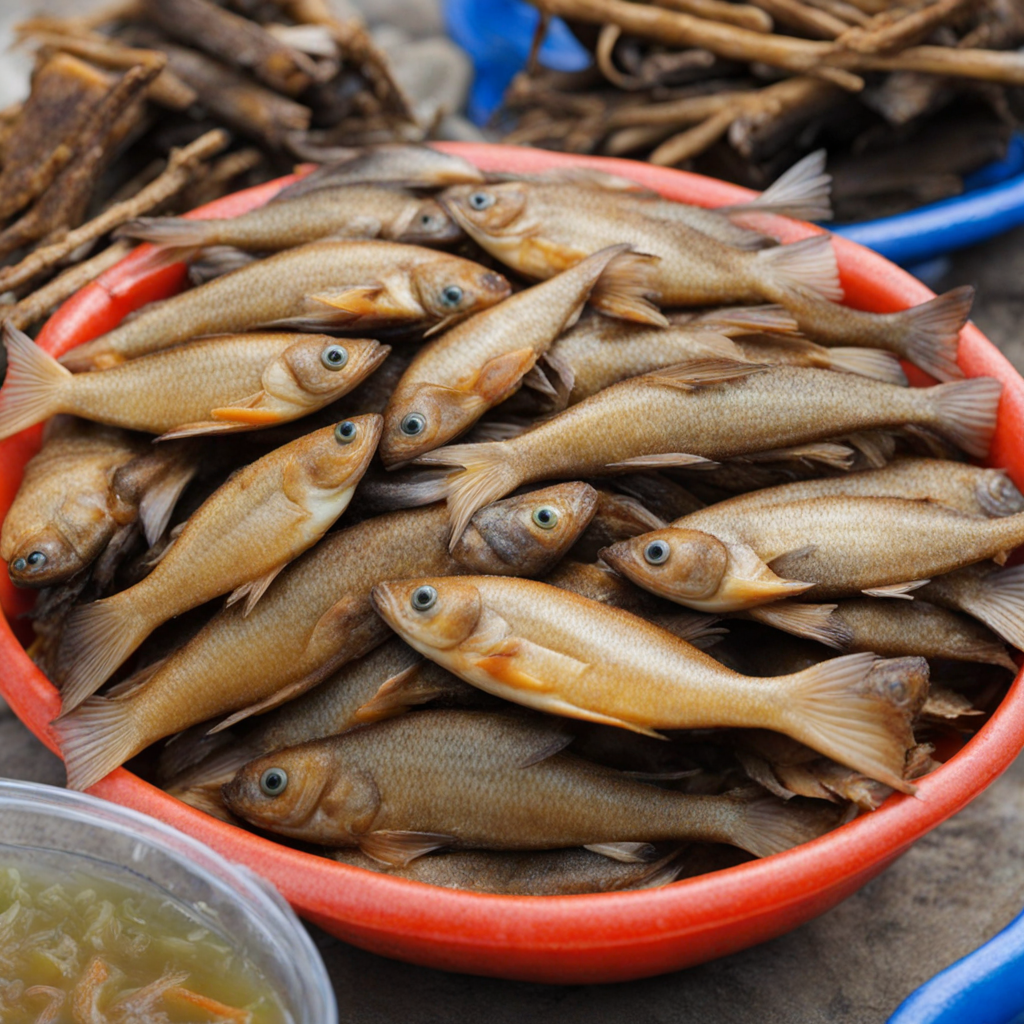Isambaza
Isambaza, also known as Lake Kivu sardines, is a traditional Rwandan delicacy that embodies the rich culinary heritage of the region. These small, silver fish are typically harvested from the pristine waters of Lake Kivu, where they thrive in abundance. Their delicate size and unique flavor make them a cherished ingredient in various dishes, offering a taste of the vibrant ecosystems of Rwanda. When cooked, Isambaza has a slightly crispy texture on the outside while remaining tender and flaky on the inside, delivering a delightful contrast that enhances every bite. Traditionally, Isambaza is prepared through grilling or frying, often seasoned simply with salt and local spices to allow the natural flavors to shine. The fish are sometimes marinated with herbs or citrus, which adds layers of flavor, while the grilling process imbues them with a smoky aroma. Served alongside staples like cassava, plantains, or Ugali, Isambaza creates a wholesome meal that highlights the simplicity and freshness of Rwandan cuisine. Isambaza is not only beloved for its taste but also for its nutritional benefits. Rich in omega-3 fatty acids, protein, and essential vitamins, this dish is a healthy option that supports sustainable fishing practices in the region. Enjoying Isambaza is more than just a culinary experience; it’s a journey into the heart of Rwanda, where food brings people together and traditions are celebrated through every flavorful bite.
How It Became This Dish
The History of Isambaza: A Culinary Gem of Rwanda #### Origins Isambaza, often referred to as "the small fish," is a beloved traditional dish in Rwanda, particularly cherished in the country's lakeside communities. The term "isambaza" specifically refers to the small sardine-like fish known scientifically as Rastrineobola argentea. This fish is predominantly found in Lake Kivu and other freshwater lakes in the region. The Rwandan people have a long-standing relationship with their natural water resources, which has significantly influenced their diet and culinary practices. The origins of isambaza can be traced back to the early settlements around Lake Kivu, where fishing became a crucial livelihood for many communities. The abundance of isambaza in the lake provided a reliable food source, which was easy to catch and rich in protein. This accessibility allowed families to integrate isambaza into their daily meals, promoting a culture of fishing that has lasted generations. #### Cultural Significance Isambaza holds a special place in Rwandan culture and cuisine. Beyond being a nutritional staple, it symbolizes community and togetherness. Traditionally, fishing and the preparation of isambaza are activities that bring families and neighbors together. The act of fishing often involved community cooperation, with groups of individuals working side by side to cast nets and haul in their catch. These communal fishing expeditions were not just about food; they fostered social bonds and strengthened community ties. In Rwandan culture, food plays a vital role in celebrations and rituals. Isambaza is often featured during family gatherings, weddings, and other significant events. Its preparation and sharing reflect a sense of hospitality and generosity. The dish is typically accompanied by staple foods such as beans, plantains, or sweet potatoes, creating a balanced meal that nourishes both body and spirit. Moreover, isambaza has also become a symbol of resilience and adaptation. Following the tumultuous history of Rwanda, including the genocide in 1994, food traditions like those surrounding isambaza have played an essential role in the country’s recovery and rebuilding process. The preparation and enjoyment of traditional foods have helped restore a sense of identity and continuity among Rwandans, serving as a reminder of their heritage and culture. #### Development Over Time The preparation and consumption of isambaza have evolved over the years, reflecting changes in society, technology, and culinary trends. Traditionally, isambaza was prepared simply, often grilled or fried, allowing the natural flavors of the fish to shine. The fish is typically cleaned, seasoned with local spices, and cooked quickly to maintain its delicate texture and taste. This straightforward method highlights the resourcefulness of Rwandans, who have learned to create delicious meals from the simplest of ingredients. As Rwanda has modernized and urbanized, so too has the culinary landscape surrounding isambaza. In urban areas, you can find isambaza served in restaurants and eateries, often accompanied by more elaborate side dishes. Chefs are now experimenting with various cooking techniques, such as baking and smoking, and incorporating international flavors to create fusion dishes that appeal to a broader audience. This evolution has not only enhanced the dish's appeal but has also created new opportunities for local fishermen and entrepreneurs to engage with the growing tourism sector. Furthermore, isambaza has garnered attention beyond Rwanda’s borders. As the global food movement embraces local and sustainable ingredients, isambaza has emerged as a culinary treasure that represents the richness of Rwandan biodiversity. Efforts are being made to promote Rwandan cuisine internationally, with isambaza often showcased as a unique and nutritious option. This newfound recognition has encouraged a resurgence of interest in traditional fishing practices and sustainable fishing methods, emphasizing the importance of preserving natural resources for future generations. #### Challenges and Sustainability Despite its cultural significance and popularity, the future of isambaza is not without challenges. Overfishing, pollution, and climate change threaten the delicate ecosystems of Lake Kivu and, by extension, the populations of isambaza. The Rwandan government and local organizations have recognized the need for sustainable fishing practices and have begun implementing measures to protect fish populations and habitats. Education campaigns aim to raise awareness about responsible fishing techniques and the importance of conserving aquatic ecosystems. Moreover, there is a growing movement among Rwandans to return to traditional fishing methods that are less harmful to the environment. These efforts reflect a broader understanding of sustainability that resonates with contemporary global values. As communities work together to ensure the sustainability of their fish populations, isambaza remains a poignant reminder of the interconnectedness of culture, cuisine, and the environment. #### Conclusion Isambaza is more than just a dish; it is a reflection of Rwanda's rich cultural heritage, communal spirit, and resilience. From its origins in the tranquil waters of Lake Kivu to its place in modern Rwandan cuisine, isambaza embodies the essence of Rwandan identity. As the country continues to navigate the complexities of globalization and environmental challenges, the story of isambaza serves as a testament to the enduring power of food as a connector of people, a keeper of traditions, and a source of nourishment for both body and soul. The future of isambaza looks bright, rooted in the past yet evolving with the times, ensuring that this culinary gem will continue to be celebrated for generations to come.
You may like
Discover local flavors from Rwanda







